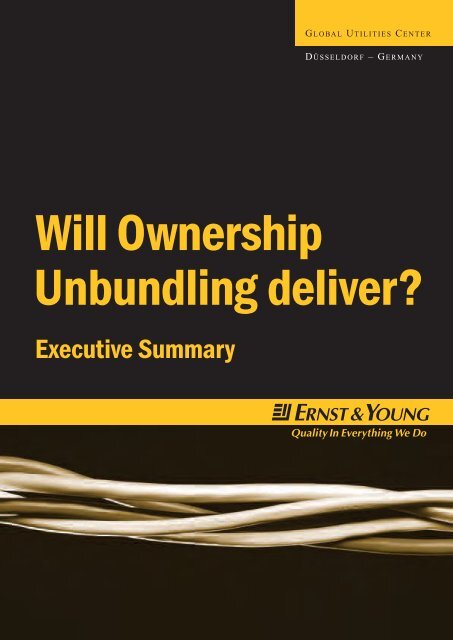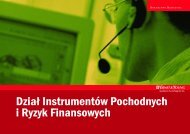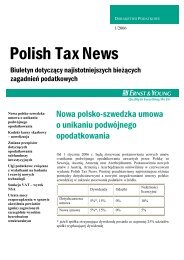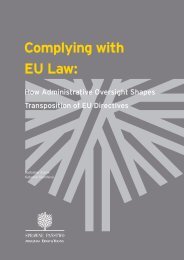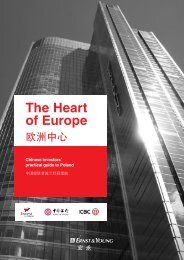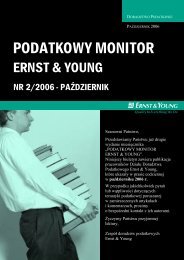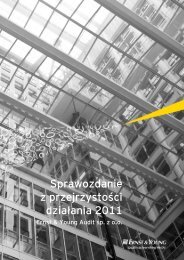Executive Summary - Ernst & Young
Executive Summary - Ernst & Young
Executive Summary - Ernst & Young
Create successful ePaper yourself
Turn your PDF publications into a flip-book with our unique Google optimized e-Paper software.
G LOBAL U TILITIES C ENTERD ÜSSELDORF – GERMANYWill OwnershipUnbundling deliver?<strong>Executive</strong> <strong>Summary</strong>!@#
<strong>Ernst</strong> & <strong>Young</strong>’s New Study onEU Energy Market Restructuring<strong>Ernst</strong> and <strong>Young</strong> is about to release a new report on the impact of unbundling on European utilities. It examines the implications for differentmarkets and the strategic options which companies now face. Below is a summary of the report’s contents and conclusions. For a copy of thefull report please get in touch with Helmut Edelmann on helmut.edelmann@de.ey.com or call your usual <strong>Ernst</strong> & <strong>Young</strong> contact.Unbundling Study 2007: <strong>Executive</strong> <strong>Summary</strong>IntroductionEuropean countries may acknowledge the value of cooperation,but they tend to resist conformity. The utilities sector is a perfectexample of this tension: there’s a massive diversity from country tocountry in terms of openness, competition, regulation, and ownershipacross the industry. The challenge on the European Union’s (EU)hands is creating a level playing field for competition in the faceof such diversity. If they cannot find a way to do this, the stated aimof the European Commission (EC) “…to open up Europe’s gasand electricity markets to competition and to create a singleEuropean energy market,” 1 could very well be in jeopardy.There are clearly two camps with clearly opposing views, one oneither side of the EU’s new proposals to deliver a single Europeanenergy market. Those in favor – which tend to be the countries aroundthe edge of Europe – have largely fulfilled ownership unbundling andmany, with the exception of the UK, have an industry which is stilldriven by state-owned utilities.The other camp – the ‘opponents’ if you like – encompassesthe countries in the middle of the European continent, where themarkets tend to be dominated by vertically integrated transmissioncompanies, in many cases privately-owned. The countries in favor –and their utilities – are likely to be seen as the winners at the endof this process.Depending on who you talk to, the proposed unbundling reformsmay or may not solve the problems of conflict of interest.Opinion among EU Member States remains divided, with Franceand Germany strongly resistant, whilst Spain, Sweden, and theUK are in favor. What is clear is that unbundling would certainlyhave serious consequences for the ownership, structure, andmanagement of the present vertically integrated utilities (VIUs),and for the utilities sector as a whole.1Sector Inquiry 10 January 20072W ILL OWNERSHIP U NBUNDLING D ELIVER?
Impacts on CompaniesSo what has been the impact of the EC’s various competitionenhancing mechanisms on utilities management so far? Whereliberalization has been fully implemented, it has often been followedby reconsolidation as the remaining large vertically integratedindustries purchase the smaller companies in the liberalized markets.There has also been a tendency for gas and electricity companiesto merge or to be acquired. This has resulted in a complex structureto the industry in Europe with a disparate population of companiesof different sizes, functions, and geographical scope (as shown in thefigure below).REGULATEDNON-REGULATEDRegulatedwires/pipes(regulatedtransmission &distribution withsome non-regulatedactivities)Regulatedintegrated(regulated generation,wires & supply withsome non-regulatedactivities)Integratedtransmission &distribution(generation & supplynon-regulated)Integrateddistribution(generation& supplynon-regulated)Non-regulatedbusinessIntegrated electricityand gas playersNational Grid EnBW, E.ON, RWE Iberdrola, Essent,NuonCentricaElectricity players Red Electrica, Terna EDP, PPC, UESR EDF, Verbund,VattenfallEndesa, Enel, CEZ,FortumAtel, Suez 2 , StatkraftGas players SNAM Rete Gas GDF ENIThe EC’s proposed third round of legislation will affect all theseorganizations differently. Specialist grid companies such asNational Grid (NG) in the UK are likely to be interested in acquiringtransmission assets or possibly in Independent System Operator(ISO) management contracts. The nature of the market for thecompetitive businesses will also change; ownership unbundlingwould bring non-discriminatory access to the grid for competinggeneration companies, with the result that sales, margins,and service standards will be challenged by new entrants.For VIUs involved in the transmission business, ownershipunbundling presents three critical decisions:1) Should they dispose of the network?2) If so, how should this be done?3) When is the right time to do it?2Only very little gas activities in BelgiumEssentially, there are two unbundling options: either create two ormore separate companies by splitting the shares, or dispose of thetransmission asset to a third party. In the case of disposal, there willbe a choice over how much cash to retain in the company, and howmuch to distribute to shareholders. The generating supply remainderof the VIU can use this cash for new investment. Management islikely to prefer this option.The next choice is how quickly to dispose of the network. There aredifferent forces that might cause management to accelerate or delaydisposal. Early disposal gives the company ‘first mover’ advantagesin the acquisition of new assets elsewhere. It is also likely that gridswill depreciate as more become available and as their strategic valuedisappears, so early disposal may be advisable. There are also somedisadvantages, but in the case of obligatory ownership unbundlingthese disadvantages will materialize in any case. The advantagesof early disposal may therefore prevail.3W ILL OWNERSHIP U NBUNDLING D ELIVER?
In the case of an ISO, the choice is in two stages. The first choiceis whether to adopt the ISO model or to go for full ownershipunbundling. Assuming that disposal is the preferred option forownership unbundling, similar considerations will govern the choice.Disposal will simplify the business, reduce regulator involvement,give first mover advantages, and relieve the company of adepreciating asset. The ISO model will diversify the business andreduce risk, but introduce contractual and regulatory complexity.From an accounting and financial communication perspective,it should also be noted that the ISO model will generate complexquestions. Even if the VIU still legally owns the network, will it stillbe possible to consolidate the assets (under IFRS or US GAAP forexample) since the VIU will actually have no control over them?The ISO model option could have tremendous impacts on the balancesheet and profit and loss of the VIUs.European StrategyUnbundling and the release of cash for acquisitions, combined withpossible resistance from competition authorities to increased presencein domestic markets, may strengthen the existing trends towardsglobalization. A radical change in unbundling requirements will havedifferent impacts across Europe, depending on the existing marketpractice. Companies will need to develop different strategies tomanage that change: those who react quickly and effectively willgain advantage.The harmonization of legal requirements across networks inEurope will simplify business models for pan-European utilities.However, sharper regulatory monitoring of unbundling requirementsmeans companies will need to audit their current unbundlingstatus rigorously.Compliance riskA third round of EU regulation with deeper unbundling, tighterregulation, and more challenging criteria for cross-border cooperationwill increase pressures to comply and to demonstrate compliance.Even for ownership unbundling, the fulfilment of legal requirementshas to be monitored by regulatory authorities. The EC thereforeintends to introduce binding guidelines for transparency, and toconvert the European Regulators’ Group for Electricity and Gas(ERGEG) to a body with statutory authority, known as ERGEG+.ERGEG has prepared draft guidelines, but it has no legal authority.There are also country-specific guidelines – for example,Germany’s state regulatory authorities and federal states havecommon guidelines to implement informational unbundling inrespect of the new energy law.To minimize compliance risk, it would be wise for utilities to be ableto demonstrate that they fulfil the current unbundling requirementsin each European market. This might best be done via a neutral,external auditor. Such a body could bring a useful new perspectiveto bear on internal discussions around how to fulfill the compliancerequirements. It is also likely that the assessment of an externalauditor would be more credible with third parties.By engaging a neutral, external institution, the utility woulddemonstrate full openness and its commitment to compliancewith the current unbundling legislation. An external body can achieveeasier implementation from its knowledge and insight of practiceand benchmarks all over Europe; it can also adopt a neutral positionregarding internal conflicts. An external assessment will alsominimize personal risks for the people responsible for implementingan unbundling compliance program, since they would not be forcedinto possible conflict with their co-workers.4W ILL OWNERSHIP U NBUNDLING D ELIVER?
Will Ownership UnbundlingDeliver a Single EuropeanMarket?The impact of ownership unbundling is limited.Ownership unbundling is just one of the steps necessaryto improve competition and ultimately establish a singleEuropean energy market. To achieve the full effect, we needthe right mix of unbundling, regulation, and cooperationbetween transmission companies, as well as harmonizedimplementation of the EU Directives, clear criteria forindependence, common rules for privately-owned andstate-owned utilities, and common rules for monitoringunbundling requirements.Topics Covered in the FullUnbundling Study<strong>Ernst</strong> & <strong>Young</strong>’s new study on the impact of energy marketrestructuring explores the issues and forces at work, and aims tosupport your thinking about how to handle the impact of changeon your business. We investigate:■ The development of unbundling and its current status in Europe■ The role of unbundling within utilities and in the wider contextof energy policy■ How the EC proposes to use unbundling to achieve a betterintegrated, more competitive European energy market■ How utilities can manage these changes to their advantage.We would welcome contributions to further debate about the issuesdiscussed here.Please contact Helmut Edelmann at:<strong>Ernst</strong> & <strong>Young</strong>, Global Utilities Center,Graf-Adolf-Platz 15, 40213 Düsseldorf,Germany. Tel: +49 211 9352 11476.E-mail: helmut.edelmann@de.ey.comAlternatively, you can obtain copies of the study from your normal<strong>Ernst</strong> & <strong>Young</strong> contact (see next page).5W ILL OWNERSHIP U NBUNDLING D ELIVER?
<strong>Ernst</strong> & <strong>Young</strong> ContactsGLOBALBen van GilsGlobal Utilities LeaderGlobal Utilities Center,Düsseldorf, GermanyDirect tel: +49 211 9352 21557E-mail: ben.van.gils@nl.ey.comAUSTRIAElfriede BaumannVienna, AustriaDirect tel: +43 1 211 70 1141E-mail: elfriede.baumann@at.ey.comHeidemarie KretschmerVienna, AustriaDirect tel: +43 1 211 70 1180E-mail:heidemarie.kretschmer@at.ey.comBALTICSJonas AkelisVilnius, LithuaniaDirect tel: +370 5 2742 200E-mail: jonas.akelis@lt.ey.comBELGIUMVincent EtienneBrussels, BelgiumDirect tel: +32 2 774 9554E-mail: vincent.etienne@be.ey.comCZECH REPUBLICJosef PivonkaPrague, Czech RepublicDirect tel: +420 225 335 603E-mail: josef.pivonka@cz.ey.comLudek JirecekPrague, Czech RepublicDirect tel: +420 225 335 480E-mail: ludek.jirecek@cz.ey.comGERMANYGerd LützelerDüsseldorf, GermanyDirect tel: +49 211 9352 18614E-mail: gerd.luetzeler@de.ey.comDr. Helmut EdelmannGlobal Utilities CenterDüsseldorf, GermanyDirect tel: +49 211 9352 11476E-mail: helmut.edelmann@de.ey.comGREECE, ROMANIA,BULGARIA, TURKEYVassilios KaminarisAthens, GreeceDirect tel: +30 210 2886235E-mail:vassilios.kaminaris@gr.ey.comYolanda Sánchez MartínAthens, GreeceDirect tel: +30 210 2886454E-mail:yolanda.sanchez-martin@gr.ey.comHUNGARYIstvan HavasBudapest, HungaryDirect tel: +36 1 451 8701E-mail: istvan.havas@hu.ey.comZoltan TremmelBudapest, HungaryDirect tel: +36 1 451 8138E-mail: zoltan.tremmel@hu.ey.comITALYDr. Massimo Delli PaoliRome, ItalyDirect tel: +39 0667 535 752E-mail:massimo.delli-paoli@it.ey.comNETHERLANDSKlaas-Jan SchoppinkThe Hague, NetherlandsDirect tel: +31 70 328 6782E-mail:klaas-jan.schoppink@nl.ey.comNORDICSJohn AvaldsnesStavanger, NorwayDirect tel: +47 517 06 740E-mail: john.avaldsnes@no.ey.comKim RichterStavanger, NorwayDirect tel: +47 982 06 674E-mail: kim.richter@no.ey.comPOLANDPiotr PielaWarsaw, PolandDirect tel: +48 22 557 75 80E-mail: piotr.piela@pl.ey.comJaroslaw WajerWarsaw, PolandDirect tel: +48 22 557 71 63E-mail: jaroslaw.wajer@pl.ey.comSPAINJuan María Román GonçalvesBilbao, SpainDirect tel: +34 944 356495E-mail:juanmaria.romangoncalves@es.ey.comDavid España MartínBilbao, SpainDirect tel: +34 944 243777E-mail:david.espanamartin@es.ey.comSWITZERLANDAlessandro MioloZurich, SwitzerlandDirect tel: + 41 58 286 46 54E-mail: alessandro.miolo@ch.ey.comThomas LüthiZurich, SwitzerlandDirect tel: + 41 58 286 30 41E-mail: thomas.luethi@ch.ey.comRUSSIADmitry LobachevMoscow, RussiaDirect tel: +7 495 228 3677E-mail: dmitry.lobachev@ru.ey.comVladimir MerkushevMoscow, RussiaDirect tel: +7 495 755 9881E-mail:vladimir.merkushev@ru.ey.comUKJon HughesLondon, UKDirect tel: +44 7899 064320E-mail: jhughes4@uk.ey.comBill EastonLondon, UKDirect tel: +44 20 7951 5463E-mail: beaston@uk.ey.comFRANCEIsabelle TriquéraParis, FranceDirect tel: +33 1 46 93 84 87E-mail: isabelle.triquera@fr.ey.comIng. Diego MassariRome, ItalyDirect tel: +39 0667 535 653E-mail: diego.massari@it.ey.com6W ILL OWNERSHIP U NBUNDLING D ELIVER?
About <strong>Ernst</strong> & <strong>Young</strong><strong>Ernst</strong> & <strong>Young</strong>, a global leader in professional services, is committed to restoring the public’s trust inprofessional services firms and in the quality of financial reporting. Its 114,000 people in 140 countriespursue the highest levels of integrity, quality, and professionalism in providing a range of sophisticatedservices centered on our core competencies of auditing, accounting, tax, and transactions. Furtherinformation about <strong>Ernst</strong> & <strong>Young</strong> and its approach to a variety of business issues can be found atwww.ey.com/perspectives. <strong>Ernst</strong> & <strong>Young</strong> refers to the global organization of member firms of<strong>Ernst</strong> & <strong>Young</strong> Global Limited, each of which is a separate legal entity. <strong>Ernst</strong> & <strong>Young</strong> Global Limiteddoes not provide services to clients.E RNST & YOUNGwww.ey.com© 2007 EYGM Limited.All Rights Reserved.SCORE EYG No. DX0022This publication contains information in summary form and is therefore intended for general guidanceonly. It is not intended to be a substitute for detailed research or the exercise of professional judgment.Neither EYGM Limited nor any other member of the global <strong>Ernst</strong> & <strong>Young</strong> organization can accept anyresponsibility for loss occasioned to any person acting or refraining from action as a result of any materialin this publication. On any specific matter, reference should be made to the appropriate advisor.


